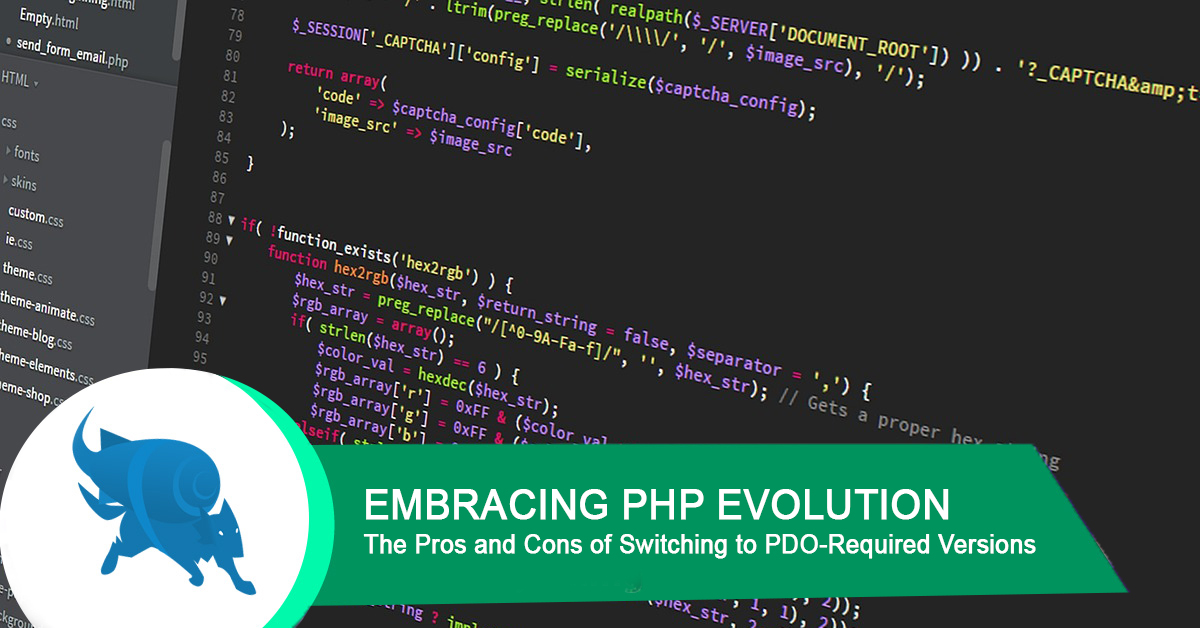PHP, a widely-used open-source scripting language, has been a cornerstone of web development for decades. As PHP continues to evolve, it has made significant strides towards becoming a more object-oriented language. One notable change in this evolution is the requirement for PHP Data Objects (PDO) in later versions. In this article, we will explore the pros and cons of switching to PHP versions that necessitate the use of PDO, highlighting how this shift represents PHP's transformation into a more robust and secure programming language.
The PHP Evolution
PHP has come a long way since its inception. Originally designed as a procedural scripting language, it has gradually adopted object-oriented programming (OOP) principles over time. This transition has made PHP more flexible, maintainable, and scalable, aligning it with modern web development practices.
PDO: The Backbone of Database Interaction
One of the most significant milestones in PHP's journey towards OOP is the widespread adoption of PDO for database interaction. PDO is a database abstraction layer that offers a unified way to interact with databases, making code more portable and secure. Here are some of the key advantages of switching to PHP versions that require PDO:
Pros of Switching to PDO-Required PHP Versions:
- Security Enhancement: PDO supports prepared statements, which significantly reduce the risk of SQL injection attacks. By forcing developers to use PDO, PHP versions prioritize security, safeguarding sensitive data.
- Database Portability: PDO abstracts database-specific functionality, allowing developers to switch between different database systems (e.g., MySQL, PostgreSQL, SQLite) with minimal code changes. This flexibility simplifies database migration and maintenance.
- Error Handling: PDO provides consistent and customizable error handling, making it easier to debug database-related issues. This improves code quality and helps developers identify and resolve problems more efficiently.
- Performance Optimization: PDO allows for reusable and optimized SQL queries, leading to better database performance. This can have a significant impact on the speed and responsiveness of web applications.
- Code Maintainability: Object-oriented programming, as encouraged by PDO, promotes modular and organized code. This enhances code maintainability, making it easier for developers to collaborate and extend applications.
- Future-Proofing: Embracing PDO aligns your codebase with modern PHP practices, reducing technical debt and making it easier to adopt new PHP features in the future.
Cons of Switching to PDO-Required PHP Versions:
While the advantages of switching to PDO-Required PHP versions are compelling, there are some potential drawbacks to consider:
- Learning Curve: Developers who are new to PDO or have experience only with traditional PHP database functions may face a learning curve. Transitioning to PDO requires mastering its API and best practices.
- Code Refactoring: If you have an existing codebase that relies on the older database functions, migrating to PDO can be a time-consuming process. You may need to refactor a substantial portion of your code.
- Compatibility: If you rely on third-party libraries or frameworks that are not yet updated to support PDO, you may encounter compatibility issues. Ensure that your dependencies are compatible before making the switch.
- Initial Development Time:While PDO offers long-term benefits, the initial development time for projects may be slightly longer due to the need for setting up PDO connections and preparing statements.
By making this transition, developers can harness the power of a more secure, maintainable, and high-performance language, paving the way for more efficient and robust web applications in the future.

